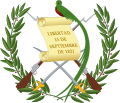| Vice President of the Republic of Guatemala | |
|---|---|
| Vicepresidente de la República de Guatemala | |
 Vice presidential flag | |
| Style | Madam Vice President (informal) Most Excellent Madam Vice President of the Republic (official) Her Excellency (alternative formal, diplomatic outside of Guatemala) |
| Member of | National Security Council |
| Residence | Guatemalan National Palace |
| Term length | Four years, non-extendable [1] |
| Inaugural holder | Clemente Marroquín Rojas |
| Formation | 1 July 1966 |
| Website | vicepresidencia.gob.gt |
| This article is part of a series on |
| Politics of Guatemala |
|---|
 |
Vice president of Guatemala (Spanish : Vicepresidente de Guatemala) is a political position in Guatemala which is since 1966 elected concurrently with the position of President of Guatemala. The current vice president is Karin Herrera.
Contents
- 1882–1886
- 1886–1887
- 1888–1921
- 1921
- 1921–1928
- 1928–1944
- 1948–1951
- 1956–1966
- 1966 onwards
- See also
- References
- Notes
The vice president needs to be a Guatemalan citizen of over 40 years of age. [2]
Historically, there have been provisions for multiple Vice Presidents, officially Designates to the Presidency (Spanish : Designados a la Presidencia), also known as Presidential Designates (Spanish : Designados Presidenciales) elected for one- or two-year-terms. The election was carried in Congress of Guatemala. A provision for First and Second Vice Presidents existed 1882–1886, 1888-1921, 1921–1928 and 1956–1966. A provision for First, Second and Third Vice Presidents existed 1921 and 1928–1944.
History of the office holders follows.




















